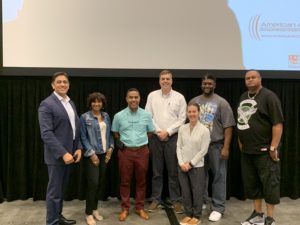By Kerry Painter, CVE
Our venues have always been a reflection of the best of our community by providing memorable moments and iconic events for its citizens as well as places of support such as fundraisers, economic impact, or in the recent decade, places of refuge from weather.
It was a stretch at first to wrap our arms around how to become a shelter. Think back to the days of Hurricane Katrina when we formed a mega-shelter committee to create best practices and train people in the line of hurricanes. Since then, earthquakes, tornados, and hurricanes have caused us to sharpen our skills and open our doors to house people and provide them medicine, safety, shelter, animal care, and nutrition. Now, we are struggling with our society’s latest challenge: active shooters and crowd terrorism. While we struggle to train our teams and find the best ways to help our staff feel empowered and safe, once again we can come to the aid of our community.
Last month our venues in Raleigh engaged IAVM’s Mark Herrera to spend the day teaching us about situational  awareness, active shooters, Stop the Bleed, and Trained Crowd Manager. This is a day of training that many of us have engaged in other cities or other venues; sadly it’s become a touring training curriculum. We invited all the region’s venues to participate along with our promoter Live Nation, our resident arts companies, related City Departments and PD/Fire. What was different this time, was that among the 300 typical attendees we also included 13 of our community’s churches.
awareness, active shooters, Stop the Bleed, and Trained Crowd Manager. This is a day of training that many of us have engaged in other cities or other venues; sadly it’s become a touring training curriculum. We invited all the region’s venues to participate along with our promoter Live Nation, our resident arts companies, related City Departments and PD/Fire. What was different this time, was that among the 300 typical attendees we also included 13 of our community’s churches.
Unfortunately, churches are now struggling with the same needs our venues are. How to keep the doors open to unknown guests but keep everyone safe in the instance of an unexpected incident. How to create an emergency plan that adapts to so many situations that are now possible. We invited several places of worship of every denomination and were honored to have 13 of them take us up on the offer. What has become evident is that these are not subjects people who manage these places are equipped to tackle with either budget or security experience.
The comments we received were:
“I took so many notes. We’re just at the beginning stages to figure this out.”
“We get complacent and forget. We learned a lot of information even as a small church.”
“We’ve got so many entrances, and when you sit up front you can’t see what’s behind. We need to figure it all out.”
So perhaps the borders of our venues are once again expanding just a little further as we come to the aid of our faith communities and share our training and security resources. I encourage you to reach out and include those in your area the next time you are working toward improving security studies, manuals, drills, trainings, or table top exercises. Any and all of these activities are not only prudent for our venues but also needed in churches, schools, or entertainment places. Go ahead, reach out and add a few more people to the room to keep your city just a little safer for everyone.
Kerry Painter, CVE, is director/general manager of the Raleigh Convention and Performing Arts Complex in Raleigh, North Carolina
